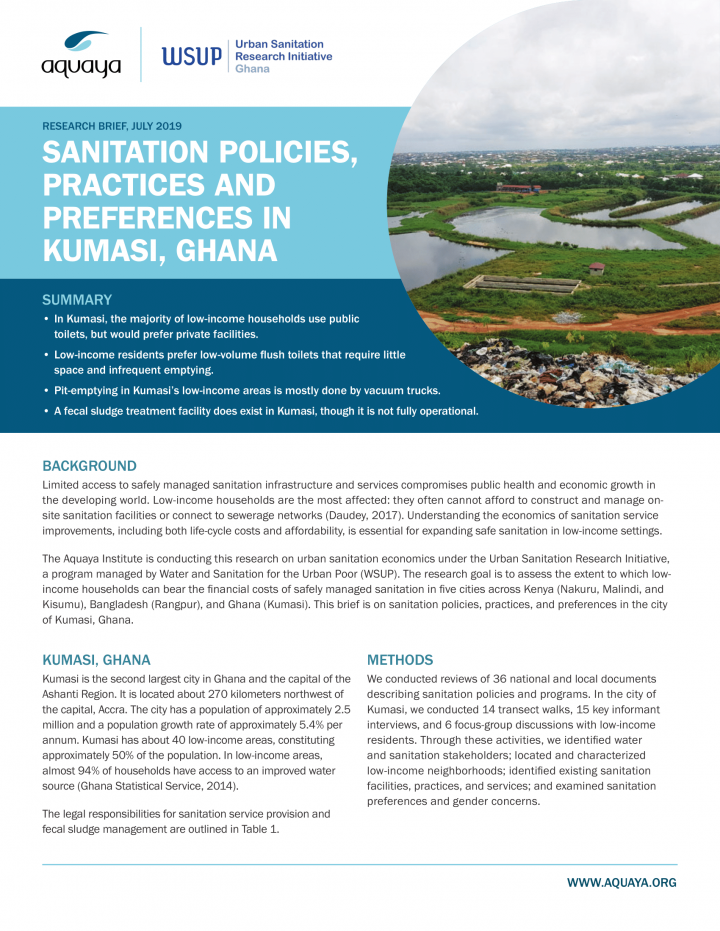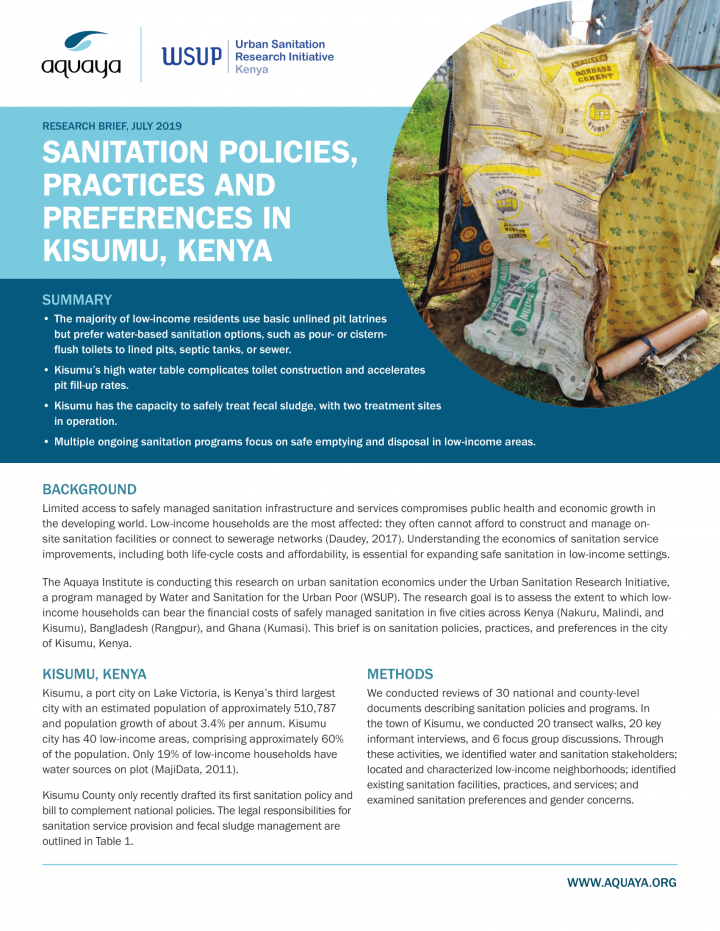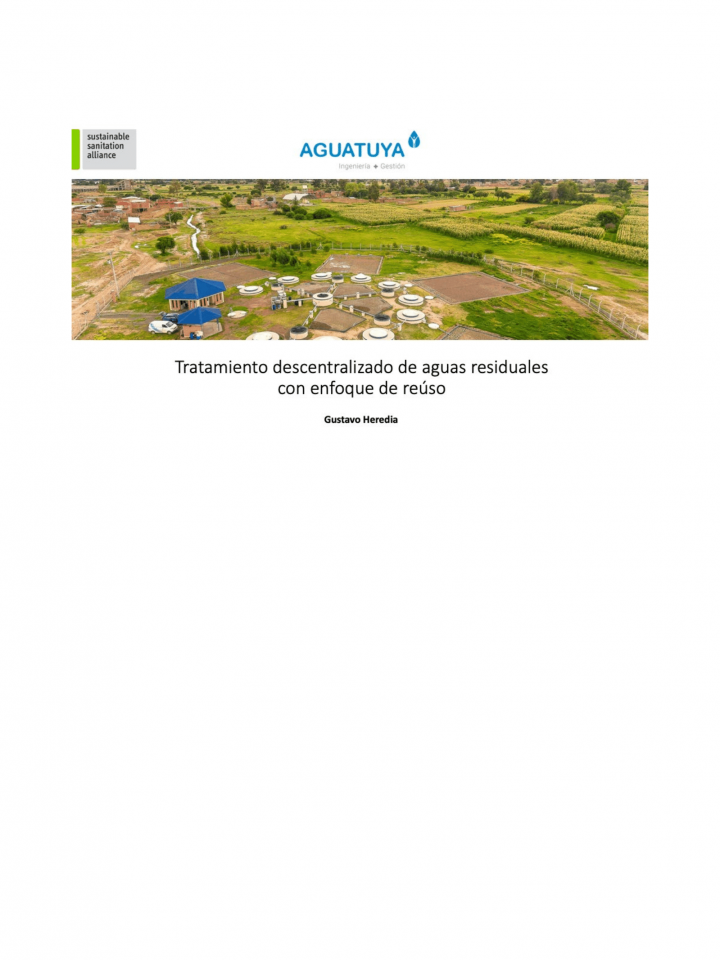The Aquaya Institute (2019) Sanitation Policies, Practices, and Preferences in Kumasi, Ghana
The Aquaya Institute is conducting this research on urban sanitation economics under the Urban Sanitation Research Initiative. This brief is on sanitation policies, practices, and preferences in the city of Kumasi, Ghana. SUMMARY • In Kumasi, the majority of low-income households use public toilets, but would prefer private facilities. • Low-income residents prefer low-volume flush toilets that require little space and infrequent emptying. • Pit-emptying in Kumasi’s low-income areas […]
The Aquaya Institute (2019) Sanitation Policies, Practices, and Preferences in Kisumu, Kenya
The Aquaya Institute is conducting this research on urban sanitation economics under the Urban Sanitation Research Initiative. This brief is on sanitation policies, practices, and preferences in the city of Kisumu, Kenya. SUMMARY • The majority of low-income residents use basic unlined pit latrines but prefer water-based sanitation options, such as pour- or cistern-flush toilets to lined pits, septic tanks, or sewer. • Kisumu’s high water table complicates […]
Various Authors (2019) 9th Emergency Environmental Health Forum in Geneva, Switzerland Conference materials
The 9th Emergency Environmental Health Forum took place from 18th -19th 2019 in Geneva, Switzerland. It brought together water, sanitation and hygiene (WASH) experts. The forum provided an opportunity to exchange recent field experiences and explore innovative approaches amongst over 110 attendees and discuss ways for future action and interventions for WASH in emergencies. EEHF 2019 conference report EEHF 2019 combined presentations
Monse, B., Pakes, U., Schlenk, J. (2019) Managing Operation and Maintenance – what does it take to reach the SDGs for WASH in Schools?
This FRESH webinar will Introduce a costing tool to calculate the budget need for schools to provide the basic service level for drinking water, usable sanitation, and handwashing with soap. The tool provides school heads with an easy to manage app, which calculates the annual cost per student depending on local condition and local prices. How much do they need to keep aside for consumables, […]
Sharma, R., Kumar, K. R., Venugopal, V., Yadava, H., Narayan, A. S. and Ramachandran, K. (2019) SFD Lite Report - Coimbatore, India
Coimbatore is the second largest city in terms of area in the state of Tamil Nadu. It is one of the fastest growing secondary cities in India and a major hub of textiles, industries, commerce, education, information technology, healthcare and manufacturing in Tamil Nadu. It is administered by the Coimbatore City Municipal Corporation (CCMC). The 76% of the excreta properly managed originates from: Wastewater (WW) contained […]
WaterAid Canada (2019) Water, sanitation and hygiene A Pathway to Realizing Gender Equality and the Empowerment of Women and Girls
The Canadian water, sanitation and hygiene (WASH) sector welcomes Canada’s new Feminist International Assistance Policy, a bold rights-based framework to guide Canada’s international development efforts that places gender equality and the empowerment of women and girls at the heart of poverty reduction. Based on the contributions of 17 organizations and individuals, this position paper presents the business case for WASH as a critical pathway to […]
Rohilla, S. K., Luthra, B., Padhi, S. K., Yadav, A. (2017) SFD Report - Siddipet, India
Siddipet is a city in Siddipet district of the Indian state of Telangana. It is a municipality and the headquarters of Siddipet mandal administrative division. The city is spread over an area of 36.03 sq.km and is divided into 34 municipal wards and 12 revenue wards. Komati Cheruvu, Narsapur Cheruvu and the Yerra Cheruvu are the major lakes of the city. The city is 110 km […]
Briceño, R. (2019) Saneamiento alternativo para zonas peri-urbanas (in Spanish) Alternative sanitation for peri-urban areas
Presentación del panelistas Raúl Briceño de X-Runner en el webinar 1 de SuSanA Latinoamérica
Heredia, G. (2019) Tratamiento descentralizado de aguas residuales con enfoque de reúso (in Spanish) Decentralised wastewater treatment with reuse approach
Presentación del panelistas Gustavo Heredia de Aguatuya en la webinar 1 de SuSanA Latinoamérica.
Arup and Oxfam (2019) Faecal Sludge Management for Disaster Relief Technology Comparison Study
On behalf of Oxfam, Arup have conducted a technical comparison study on Faecal Sludge Management at the Rohingya camps close to Cox's Bazar (CXB), Bangladesh. The aim of the study is to draw conclusions on best practice FSM for disaster relief, from evidence gathered through practical experience. The study used existing available data to inform the analysis and in many cases these datasets are limited. […]
Coelho, D. (2019) Saneamiento Condominial asegurando Saneamiento Inclusivo (in Spanish) Condominial Sanitation ensuring Inclusive Sanitation
Presentación de la panelistas Deise Coelho sobre saneamiento condominial en el webinar 1 de SusanA Latinoamérica
Brinkman, A. (2019) Marketing of compost in emerging markets A guidance document for compost producers
The recycling of organic residues into compost has a number of advantages. It avoids the wasting valuable organic material to landfills and reduces associated emissions to water, soil and air. It generates a product that contributes to long-term soil quality, as compost contains a high amount of stabilised organic matter. Finally, compost may also reduce the need for artificial fertilisers, as it can (at least […]
WASH Netzwerk (2015) Compendium of Faecal Sludge Management (FSM) Technical Options in Emergencies
This compendium presents a range of technical options relating for collection, transport, treatment and disposal of fecal sludge in an emergency . It should be used as a guide to identify possible solutions for specific emergency situations and contexts. The final choice of options may need to combine different approaches and technologies and will depend on the phase of the emergency. Each technology option is presented […]
GWC (2019) Guidance on Market Based Programming For Humanitarian WASH Practitioners
The purpose of this document is to provide practical guidance in preparedness, assessment, program design, implementation and monitoring related to Market-Based Programming (MBP) in humanitarian WASH assistance, and more specifically on: • How to identify linkages between markets and WASH services & goods; • How market based programming can complement and improve WASH programming; • How to conduct a WASH market assessment; • The key implementation steps & considerations […]
Rohilla, S. K., Luthra, B., Yadav, A., Gupta, B. (2017) SFD Report - Kannur, India
Kannur, also known by its English name Cannanore, is a city in Kannur district, state of Kerala, India. It is the administrative headquarters of the Kannur district and situated 518 km north of the state capital Thiruvananthapuram. Kannur is famous for its pristine beaches, Theyyam (its native performing art), and its handloom industry. Kannur Municipal Corporation (KMC) is the largest urban local body of the […]
Rohilla, S. K., Luthra, B., Yadav, A., Gupta, B. (2017) SFD Report - Kalpetta, India
Kalpetta is a town and a municipality in the Wayanad district, of Kerala, India. It is the headquarters of Wayanad district as well as the headquarters of Vythiritaluk. It is a bustling town surrounded by dense coffee, tea plantations and hills (KM, 2015). Apart from being the administrative capital of the district, Kalpetta is also the centre of tourism, as it is currently located within the […]
Rohilla, S. K., Luthra, B., Bhatnagar, A., Gupta, B. (2017) SFD Report - Bijnor, India
Bijnor city is located 12 km west to the bank of River Ganga and 460 km from Lucknow, the state capital of Uttar Pradesh. Bijnor is the district headquarters of Bijnor district. As per Census 2011, Bijnor has a population of 93,297 residing in 17,715 households. The urban local body governing the town is Bijnor Nagar Palika Parishad (BNPP) or (Bijnor Municipal Council). The city has […]
Rohilla, S. K., Luthra, B., Padhi, S. K., Yadav, A., Varadharajan, A. (2017) SFD Report - Bansberia, India
Bansberia is a town in the Hooghly district of West Bengal, India. Bansberia Municipality was the nerve centre of “Saptagram”, a port city, famous for its inland and foreign trades with Europe since 17th Century. It is rich in its heritage and tradition and has a number of historical sites such as Hanseswari Temple and Zafar Khan Ghazi Mosque and Dargah. (BM, 2015). All households are […]
SNV (2019) Emotional demonstrations (emo-demos) of handwashing with soap at vaccination centres
Emotional demonstrations (emo-demos) are used in behaviour-centred design to trigger behaviour changes, such as handwashing with soap, by creating disgust and shame. Through the Sustainable Sanitation and Hygiene For All (SSH4A) programme, vaccination centres in villages were found to be an ideal place to raise awareness of the importance of washing hands with soap among pregnant women, mothers and caregivers. This case study presents the emo-demo for […]
SNV (2019) Jirani sanitation groups Sustaining open defecation free status in Tanzania
The sustainability of open defecation free (ODF) status in rural areas where toilets frequently collapse is a global concern. In Tanzania, SNV has developed an innovative approach called Jirani sanitation groups (JSGs). 'Jirani' means neighbour and the approach is based on community support; if a toilet collapses another can be built with the help of neighbours. This case study presents the JSGs intervention, providing practical information for […]




















